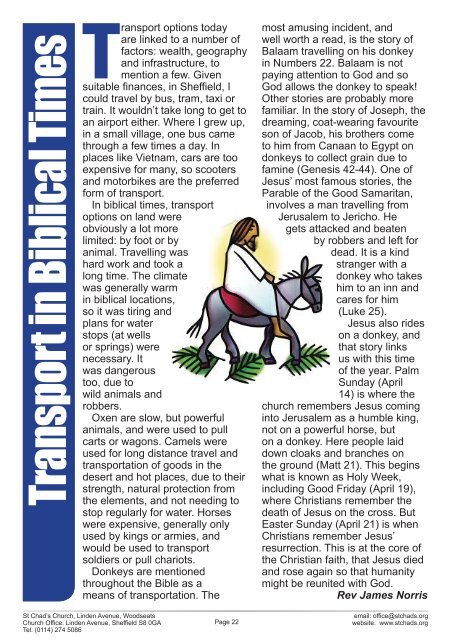You also want an ePaper? Increase the reach of your titles
YUMPU automatically turns print PDFs into web optimized ePapers that Google loves.
Services at St Chad’s<br />
Transport in Biblical Times<br />
Transport options today<br />
are linked to a number of<br />
factors: wealth, geography<br />
and infrastructure, to<br />
mention a few. Given<br />
suitable finances, in Sheffield, I<br />
could travel by bus, tram, taxi or<br />
train. It wouldn’t take long to get to<br />
an airport either. Where I grew up,<br />
in a small village, one bus came<br />
through a few times a day. In<br />
places like Vietnam, cars are too<br />
expensive for many, so scooters<br />
and motorbikes are the preferred<br />
form of transport.<br />
In biblical times, transport<br />
options on land were<br />
obviously a lot more<br />
limited: by foot or by<br />
animal. Travelling was<br />
hard work and took a<br />
long time. The climate<br />
was generally warm<br />
in biblical locations,<br />
so it was tiring and<br />
plans for water<br />
stops (at wells<br />
or springs) were<br />
necessary. It<br />
was dangerous<br />
too, due to<br />
wild animals and<br />
robbers.<br />
Oxen are slow, but powerful<br />
animals, and were used to pull<br />
carts or wagons. Camels were<br />
used for long distance travel and<br />
transportation of goods in the<br />
desert and hot places, due to their<br />
strength, natural protection from<br />
the elements, and not needing to<br />
stop regularly for water. Horses<br />
were expensive, generally only<br />
used by kings or armies, and<br />
would be used to transport<br />
soldiers or pull chariots.<br />
Donkeys are mentioned<br />
throughout the Bible as a<br />
means of transportation. The<br />
most amusing incident, and<br />
well worth a read, is the story of<br />
Balaam travelling on his donkey<br />
in Numbers 22. Balaam is not<br />
paying attention to God and so<br />
God allows the donkey to speak!<br />
Other stories are probably more<br />
familiar. In the story of Joseph, the<br />
dreaming, coat-wearing favourite<br />
son of Jacob, his brothers come<br />
to him from Canaan to Egypt on<br />
donkeys to collect grain due to<br />
famine (Genesis 42-44). One of<br />
Jesus’ most famous stories, the<br />
Parable of the Good Samaritan,<br />
involves a man travelling from<br />
Jerusalem to Jericho. He<br />
gets attacked and beaten<br />
by robbers and left for<br />
dead. It is a kind<br />
stranger with a<br />
donkey who takes<br />
him to an inn and<br />
cares for him<br />
(Luke 25).<br />
Jesus also rides<br />
on a donkey, and<br />
that story links<br />
us with this time<br />
of the year. Palm<br />
Sunday (April<br />
14) is where the<br />
church remembers Jesus coming<br />
into Jerusalem as a humble king,<br />
not on a powerful horse, but<br />
on a donkey. Here people laid<br />
down cloaks and branches on<br />
the ground (Matt 21). This begins<br />
what is known as Holy Week,<br />
including Good Friday (April 19),<br />
where Christians remember the<br />
death of Jesus on the cross. But<br />
Easter Sunday (April 21) is when<br />
Christians remember Jesus’<br />
resurrection. This is at the core of<br />
the Christian faith, that Jesus died<br />
and rose again so that humanity<br />
might be reunited with God.<br />
Rev James Norris<br />
St Chad’s Church, Linden Avenue, Woodseats<br />
Church Office: Linden Avenue, Sheffield S8 0GA<br />
Tel: (0114) 274 5086<br />
Page 22<br />
email: office@stchads.org<br />
website: www.stchads.org

















